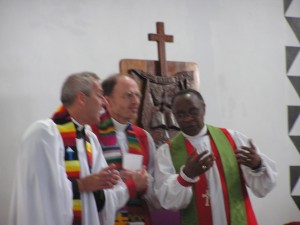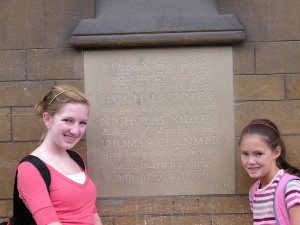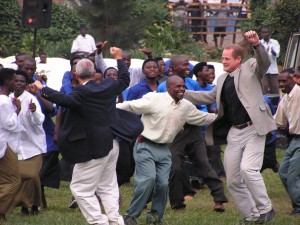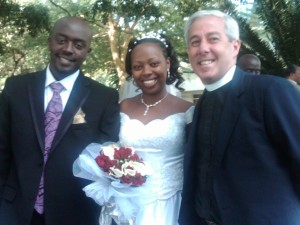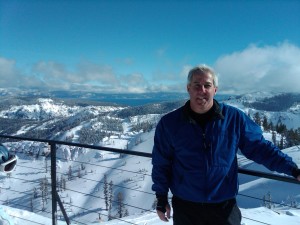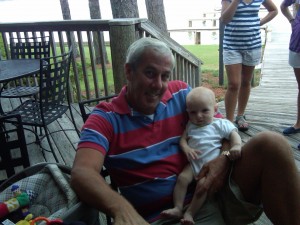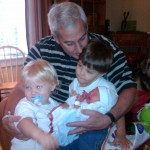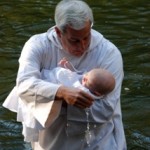About . . .
The adjectives “ancient” and “future” seem to be an elusive description for something as well known as the church. But the church we see today is far cry from what Jesus started. An ancient church without future elements is mired in traditionalism and will fossilize and die like the languages of antiquity. Likewise, a contemporary church that is too closely tied to the culture around it will also pass into oblivion. In order to pursue the extraordinary and divine entity that Jesus had in mind, it is necessary to blend the best attributes of the church of old and the church of the modern era.
The church of my youth is largely irrelevant to me. It is rightly rooted in the tradition of the ancient church, but wrongly mired in the past. It seeks to communicate abiding truth in a fleeting language by an even more fleeting means.
The ancient church can’t continue to speak Latin when the vast majority of those for whom truth is intended have never read or heard it. The church can’t stay unilaterally committed to the great hymns of the sixteenth century when the pace is like that of a dirge. The texts are certainly true enough, but they were written to be played on an organ, an instrument for which you can no longer buy parts. If there were a large listening market for the organ, you could hear it on every other FM channel. A church blindly committed to the past will euthanize itself and bring about its end much faster.
Likewise, the church of my adulthood is largely irrelevant to me as well. It rightly seeks to address the modern world, but wrongly ties itself to something as fleeting as Woodstock or Lady Gaga. It, too, will fade into history, but unlike the ancient church, it will happen in days or weeks as opposed to centuries or millennia.
The contemporary church takes on the characteristics of the culture around it. In America, the prevailing culture leads the church to shallowness. It follows a narcissistic world view in which we are entertaining ourselves to death. We essentially become spectators, not the active participants that ancient liturgy required.
Modern pastors are literally hawking health and prosperity, two things to which our current culture tells us we are entitled. The contemporary church teaches that poverty and disease are not meant to be a part of the Kingdom experience and fails to acknowledge that we are called to suffer for the welfare of others, just as its founder did.
Dean William R. Inge once said that “he who marries the spirit of the age will find himself soon widowed.” Fads die. And so do churches wed to the zeitgeist, whether the spirit is ancient or future.
The goal for the church should be to strike a balance between “ancient” and “future” and to find a way to live in the tension between the two. However, the truth is that it is much easier to be one or the other because a tensionless world is the path of least resistance.
Depravity makes it so that humans don’t seek tension and this is clearly reflected in the church. Tension is intellectually and emotionally demanding, so we resolve it in favor of one extreme or the other. The church is either legalistic or antinomian, but rarely both. It is either overly rational or overly experimental, but rarely both.
In an effort to turn our backs on tension, we also wrongly ignore the hardships which Christians endured before the church became wed to the culture in 313 A.D. This contributes greatly to the modern church’s belief that suffering and Christ do not go hand in hand.
Clearly the church must be Ancient Future however elusive. Pressure to be easily understandable and readily marketable be damned. It must adapt without losing its core truth. It must, as John Stott says, engage without compromise. The church cannot retreat. It cannot stand still. And yet it cannot yield its truth to the moment as it moves forward! It must live into then tension of what was dubbed long ago “Christ and culture in paradox.”
This site is a forum for exploring the tension necessary to being the church Jesus started. And explore we must. For as leprous as the bride may be in any age, it remains the God chosen means by which he advances His Kingdom.
ABOUT THE AUTHOR
John Richardson is an Anglican missionary priest serving the United States under the direction of the Anglican Church of Rwanda via PEARUSA. He partners with the Anglican Church in North America (ACNA)serving their Anglican Diocese of the South (ADOTS) as Canon for Church Planing. He has a Masters of Divinity from the University of the South (Sewanee), 1993, and a Doctor of Ministry from Trinity Evangelical Divinity School (TEDS), 1999. He is a former missionary to Bolivia. From 1996 to 2002 John led the 6th fastest growing Episcopal (US branch of Anglicanism) church in the US. Since, he has led, as founding pastor, a rapidly growing Anglican church (AMiA) in Birmingham. He recently relinquished that post after seven and a half years and following a sabbatical has moved to the Brookhaven/Chamblee area of Atlanta to plant an Ancient Future Church.
John is married to Kristen Richardson. They have five children Mary (20), Madison (13), Dow (3 1/2), Whit (2), and Graham (9/24/11). In the few moments free of church leadership and parenting, John pursues a few idols including sun, boating, wakeboarding and snow skiing. He’s also rather fond of his undergraduate alma mater, the University of Alabama.
Favorite Non-Fiction Books/Authors
Oden -The Transforming Power of Grace
Dodd – The Apostolic Preaching and its Development
Bonhoeffer – The Cost of Discipleship
Stott – The Cross of Christ
Forde – On Being a Theologian of the Cross
Green – I Believe in the Holy Spirit
CS Lewis – Mere Christianity
Smalley/Trent – The Blessing
Niebuhr – Christ and Culture
Blank – UN-Comfortable Words
Alexander – The Secular Squeeze
Hauerwas/Willimon – Resident Aliens
MacDonald – Who Stole My Church
Rick Warren – The Purpose Driven Church
Favorite Fiction Books/Authors
Clive Cussler – Dirk Pitt Series
Robert Ludlum – Bourne Series
Ken Follett – Pillars of the Earth
Jan Karon – Mitford Series
Brad Thor – The Apostle
Favorite Movies
The Mission
Dead Poet Society
The Truman Show
Mr. Holland’s Opus
Good Will Hunting
Lord of the Rings Trilogy
RV
Hotel Rwanda
A Few Good Men
With Kristen – Titanic, Notting Hill, Fool’s Gold and Top Gun
Favorite Places
Water – Lake Martin and the Emerald Coast
Snowbird, Salt Lake City, Utah, USA
The Trout, Oxford, England, UK
Wrigley Field, Chicago, Illinois, US
Covent Garden, London, England, UK
Bodega Bay/Healdsburg, California USA
Grand Place, Brussels, Belgium
